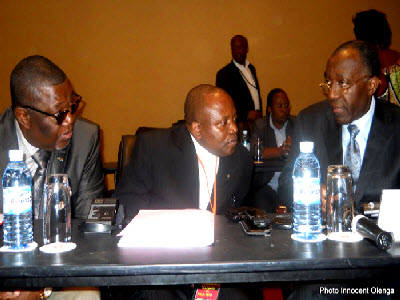
DR Congo’s government spokesman Lambert Mende said that the two sides each signed a different document from the one signed by the other side on Thursday in Nairobi, Kenya.
According to Mr. Mende, the M23 renounced any resort to armed rebellions. The M23 also reiterated its dissolution, which it had announced after its military defeat against the Congolese army in November.
In the declaration signed by DR Congo’s Minister of Foreign Affairs, Raymond Tshibanda, the Congolese government said it “notes the declaration by the M23 and also proclaims its commitment to facilitate the implementation of this renunciation of armed struggle by the M23.”
The Congolese government committed to implement a program of disarmament, demobilization and reintegration of former rebels and present a draft amnesty law to Parliament.
Mr. Mende said that the amnesty would apply “only to acts of war and acts of insurrection and not war crimes or crimes against humanity.”
Another document was signed by Uganda's President Yoweri Museveni on behalf of the International Conference on Great Lakes Region (ICGLR) and Malawi's President Joyce Banda on behalf of the Southern African Development Community (SADC).
The two leaders took note of the end of the Kampala peace talks and called on both sides to fulfill their respective commitments.
These peace talks should have been concluded on November 11 in Kampala. But the two sides could not agree on the title of the document announcing the end of discussions. Kinshasa had said it would sign a simple “declaration”, not a “peace agreement.”
“It’s the formula that the Congolese government was asking for that was chosen,” Mr. Mende said.
The signing of the two declarations in Nairobi marks the end of the peace talks which lasted one year.
Last month, the Congolese army, supported by UN peacekeepers, dislodged the M23 rebels from all areas they had occupied in North Kivu province for more than a year.
Related articles
- • DRC and Rwanda Sign Declaration of Principles for Peace in Eastern Congo (April 25, 2025)
- • European Union Sanctions Rwanda and M23 Officials over Congo Conflict (March 17, 2025)
- • Canada and Germany Impose Sanctions on Rwanda for Supporting M23 Rebels (March 4, 2025)
- • UK Suspends Financial Aid to Rwanda Over M23 Rebellion (February 25, 2025)
- • European Union Suspends Defence Consultations with Rwanda (February 24, 2025)
- • Tshisekedi Announces Government of National Unity and Calls for Unity Against M23 Rebels (February 23, 2025)
- • UN Security Council Calls on Rwanda to Stop Supporting M23 Rebels in DR Congo (February 22, 2025)
- • US Sanctions Rwanda's Minister James Kabarebe for Central Role in DR Congo Conflict (February 20, 2025)
- • Rwanda-Backed M23 Rebels Summarily Executed Children in Bukavu, UN Reports (February 19, 2025)
- • DR Congo Citizens Head to Polls to Elect President, Members of Parliament (December 20, 2023)
- • 'Deadly environment' plus 'political and social' obstacles hinder Ebola fight, Security Council hears (July 24, 2019)
- • Ebola outbreak declared an international Public Health Emergency (July 17, 2019)
- • Botswana Urges Joseph Kabila to Step Down (February 26, 2018)
- • No elections in DR Congo in December without electronic voting machines: INEC (February 13, 2018)
- • DRC Seeks Arrest of Presidential Candidate Moise Katumbi (May 19, 2016)
- • Peacekeepers, Congo Army to Resume Joint Fight Against Rwandan Rebels (January 28, 2016)
- • Political tensions 'running high' in DR Congo ahead of 2016 elections (October 7, 2015)
- • UN Report Blames Ugandan Islamists for 237 Killings in DR Congo (May 14, 2015)
- • DRC Army Putting Pressure on FDLR (April 1, 2015)
- • Violence in North Kivu Kills 21, Mostly Women, Children (October 18, 2014)
- • Southern African Leaders to Meet in Zimbabwe (August 15, 2014)
- • ICC confirms war crimes charges against Bosco Ntaganda (June 10, 2014)
- • Senior UN officials urge Brazzaville to halt expulsion of DR Congo nationals (May 26, 2014)
- • Kerry Calls on Kabila to Honor Constitution (May 4, 2014)
- • Kerry in DR Congo for Security Talks (May 3, 2014)
- • Security Council extends UN mission, intervention force in DR Congo for one year (March 28, 2014)
- • Death toll in Lake Albert boat accident rises to 251 (March 27, 2014)
- • U.S. sending more personnel to Uganda to hunt LRA leader Joseph Kony (March 24, 2014)
- • Death toll in Lake Albert boat accident rises to 108 people (March 24, 2014)
- • DR Congo Takes Chairmanship of COMESA at Summit in Kinshasa (February 26, 2014)







